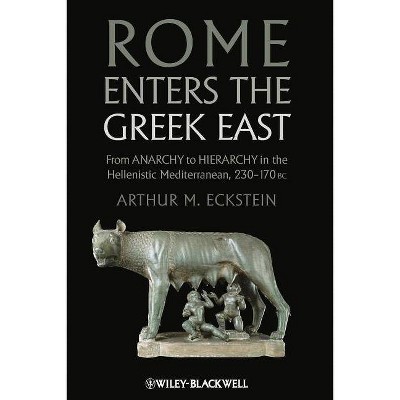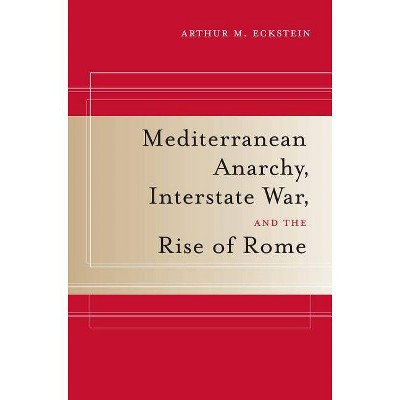Rome Enters the Greek East - by Arthur M Eckstein & F Ed Eckstein (Paperback)

Similar Products
Products of same category from the store
AllProduct info
<p/><br></br><p><b> Book Synopsis </b></p></br></br>This volume examines the period from Rome's earliest involvement in the eastern Mediterranean to the establishment of Roman geopolitical dominance over all the Greek states from the Adriatic Sea to Syria by the 180s BC. <ul> <li>Applies modern political theory to ancient Mediterranean history, taking a Realist approach to its analysis of Roman involvement in the Greek Mediterranean</li> <li>Focuses on the harsh nature of interactions among states under conditions of anarchy while examining the conduct of both Rome and Greek states during the period, and focuses on what the concepts of modern political science can tell us about ancient international relations</li> <li>Includes detailed discussion of the crisis that convulsed the Greek world in the last decade of the third century BC</li> <li>Provides a balanced portrait of Roman militarism and imperialism in the Hellenistic world</li> </ul><p/><br></br><p><b> From the Back Cover </b></p></br></br>This volume examines the period from Rome's earliest involvement in the eastern Mediterranean to the creation of the first stage of Roman dominance over all the Greek states from the Adriatic Sea to Syria by the 180s BC. Applying modern political theory to ancient Mediterranean history, it takes a Realist approach to its analysis of the development of Roman involvement in the Greek Mediterranean and employs unipolarity theory to examine the earliest era of Roman geopolitical dominance over the Greek states. Focusing on the harsh nature of interactions among states under conditions of international anarchy, the book examines the conduct of both Rome and the Greek states during the period, and the beginning of the replacement of anarchy by a situation of hierarchy and unipolarity. <p>In addition to providing an overview of the entire revolutionary period between 230 and 170 BC, the volume focuses detailed discussion on the geopolitical crisis that convulsed the Greek world in the last decade of the third century bc. This crisis led first to the violent collapse of the traditional Greek state-system based on the three great powers of Macedon, Syria, and Egypt, then to a revolution in Greek diplomacy towards Rome (201-200 BC) as second-tier states pleaded for Roman intervention in the crisis, then to the beginning of Rome's permanent involvement in the high politics of the Greek Mediterranean, and finally to the creation of a situation of Roman unipolarity in the Greek Mediterranean. The first stage of that unipolarity (ca. 190-170 BC) is then analyzed in detail.</p> <p><i>Rome Enters the Greek East</i> offers a balanced portrait of Roman militarism and imperialism that is essential reading for scholars interested in the interaction of Rome and the Hellenistic world.</p><p/><br></br><p><b> Review Quotes </b></p></br></br><br><p>A strength of Eckstein's volume is the balance of international relations theory with the detailed history of the transformation of the Hellenistic multipolar anarchy from the First Illyrian War to the period of Roman "unipolarity". This consolidates the placement of political theory within current historiography of the interstate relations of the mid- Republic and Hellenistic world. Based on the reception of IR Realism in the various studies cited here which have engaged directly or peripherally with Eckstein's volume, there are two major ideas for which he argues that are already working their way through the ancient historical consciousness: that fear, threat, force and violence underpin interstate discourses and were commonplace in the experiences and strategies of both primary and secondary polities; and that all polities were stakeholders in international relations, with neither Roman (or others') ambivalence preventing their participation, nor secondary states' comparative weakness limiting their determination to join the negotiation of conflict. We shall in future see much more scholarship based upon these two central arguments. (<i>Bryn Mawr Classical Review</i>, 7 May 2013)</p> <p> </p><br><p/><br></br><p><b> About the Author </b></p></br></br><b>Arthur M. Eckstein</b> is a specialist in the history of Roman imperialism. He has published three books, <i>Senate and General: Individual Decision-Making and Roman Foreign Relations, 264-194 BC</i> (1987), <i>Moral Vision in the Histories of Polybius</i> (1995), <i>Mediterranean Anarchy, Interstate War and the Rise of Rome</i> (2006), and 50 major scholarly articles. He is also co-editing an edition of Polybius' Histories.
Price History
Price Archive shows prices from various stores, lets you see history and find the cheapest. There is no actual sale on the website. For all support, inquiry and suggestion messagescommunication@pricearchive.us



















